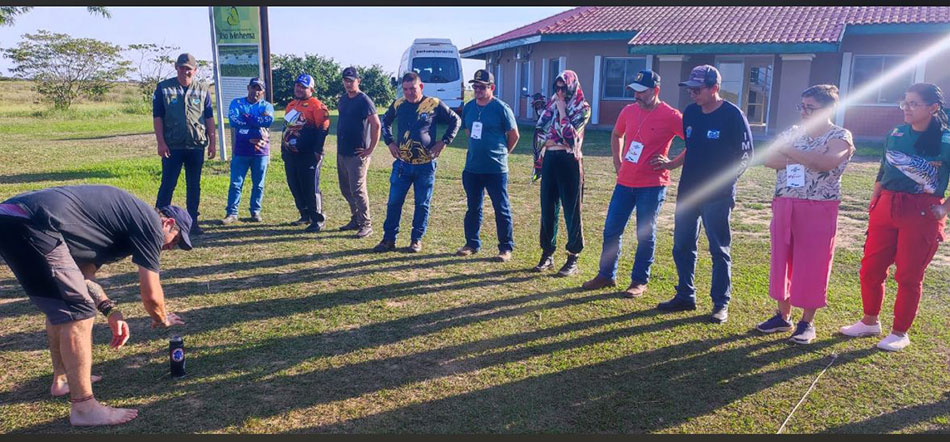The Cerrado Circular Program was launched in 2022. Its goal is to engage the local community in the development of businesses related to the Cerrado bioeconomy
The first phase
between (September 2022 – January 2023) called for businesses in typical Cerrado cuisine, meliponiculture with native bees, and community-based tourism. The program identified local leaders and mobilized 40 participants. In addition to the call for proposals, these businesses were accelerated through workshops on planning, gastronomy, pricing, and sustainable tourism. After the acceleration, 6 businesses were selected and received seed capital.
The second phase
between (May 2023 – January 2024) had two main objectives
1. to provide ongoing mentorship to the business initiatives selected in Phase 1;
2. to initiate studies and planning for establishing a network for the sustainable extraction of Cerrado fruits, called “Casa do Baru”, with Baru as its flagship.
A major innovation of the program was the creation of Casa do Baru as a hub for typical Cerrado fruits and nuts, with an initial focus on roasted Baru nuts. At the same time, the Baru Extractivism Network was created under the coordination of APOMS (Association of Organic Producers of Mato Grosso do Sul).
The Casa do Baru serves as a channel for the exhibition and sale of Cerrado products. It is also a meeting place for the network, thus broadening the participation in the program. The outcome is income generation for program participants, combined with an increase in the program’s sphere of influence, promoting the conservation of the Cerrado biome.
The third phase
currently under implementation, focuses on increasing the scale, scope and effectiveness of the program in promoting sustainable economic activities related to the conservation of the Cerrado biome.
The three main areas of effort are:
1. Continuing to mentor businesses started in the first phase;
2. Starting operations at Casa do Baru;
3. Training and developing the skills and self-awareness of program participants to increase engagement.

A master’s thesis at Harvard University, The Value Chain of Sustainable Baru Extraction, was the foundational document for the planning of Casa do Baru. Access it at this link.
Read alsoThe Cerrado Circular Program is being implemented in the municipality of Nova Andradina, in the state of Mato Grosso do Sul, in partnership with APOMS (Association of Organic Producers of Mato Grosso do Sul) and the Cerrado Guarani Institute. The target participants are smallholder producers in the settlements of São João and Teijin. As of Phase 3, participants from other settlements in the region will be invited to participate as part of the Extractivism Network.
Program Modules
The fieldwork in the São João and Teijin settlements and the community-based tourism workshop had the following objectives:
- Valuing and strengthening local communities, their culture and expertise, and sharing them with tourists seeking transformative and purpose-driven travel that respects sustainability, the SDGs, and the conservation of the Cerrado native vegetation.
- Promoting appreciation of the Cerrado biome and the importance of preserving its ecosystem.
- Encouraging the community and sensitizing community leaders about the possibilities of grassroots tourism in the region.
- Encouraging local people to find new sources of income through community-based tourism.
The community identified the following opportunities for rural tourism in the region: birdwatching, bicycle tourism, interpretive trails and environmental education, harvesting and planting workshops, Cerrado cuisine and medicinal herbs, and motor home reception.
Melliponiculture is the breeding of native stingless bees. This module trains producers through theoretical and practical workshops and supports production by providing materials and equipment. The program complements other programs that support the production of honey from stingless bees in the region by training model meliponaries and swarm multipliers. Besides contributing to environmental conservation through pollinator multiplication, meliponiculture is linked to tourism, typical cuisine and the extractivism network, providing ingredients and complementary products for other areas of the program.
The Cerrado offers several fruits that are still little explored for domestic consumption and sale. The typical culinary module aims to revive the use of these fruits in breads, cakes, cookies and other processed foods. We anticipate that the establishment of small industrial kitchens will allow the provision of products for school lunches and direct sales through the channels established by the Baru extraction network and the tourist routes outlined by the program. This approach effectively reconciles income generation with the conservation of the native Cerrado vegetation.














